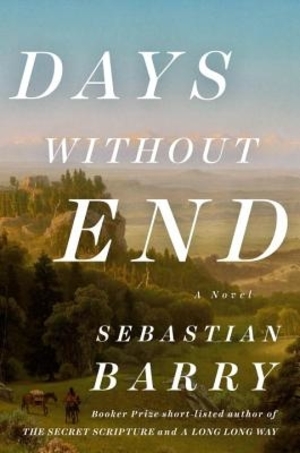Days Without End, Sebastian Barry’s Costa Award winning 9th novel, is a visceral and lyrical western that is traditional only in the sense that there are horses and Indians. Barry’s strength is how he uses non-traditional tropes to tell the story of America. Each page of this short novel feels new and alive as we venture off through the eyes of young Irish McNulty coming of age in the 1850s and 60s. Author Barry writes with a prose that is a fresh, kind, smart, and at times startling in its brutality.
[alert variation=”alert-info”]Publisher: Viking
Formats: Hardcover, Paperback, eBook, Kindle
Purchase: Powell’s | Amazon | IndieBound | iBooks[/alert]
Young Thomas McNulty is an outcast from the start the book, a kid who survived and escaped the Irish famine surrounded by the death of everyone he knew in Sligo. He escapes his destroyed home, and finds himself first in Canada and then in the unfriendly North American. But McNulty is strong and he ventures out. Eventually, he partners up with John Cole, a thirteen-year-old who is part native, and two fast friends engage in a relationship that unfolds over the course of the book.
The early pages are full of odd details that could feel out place in a western, but don’t because of Barry’s skill. The two boys find a job working as cross-dressing female dancers in a bar for grizzled men who treat them like the ladies they are pretending to be. Another writer would botch this, but Barry makes it feel truthful and real. He plays with identity, specifically regarding gender, throughout the book, and the exploration of identity is central. Thomas and John Cole engage in a relationship, sexually and emotionally, and this is presented casually, which is surprising and refreshing.
Violence soon chases the sweet intimacy of the boys, and a maelstrom engulfs them in blood. Skirmishes and battles with natives produce chaos and endless bodies in a pre-Civil War expanding America. Barry writes all of this in dense paragraphs that gallop and are easy to get lost in. But at times the writing can be too much and hard to follow.
Eventually, the Civil War creeps in and the narrative takes on a larger scope. The world Barry renders in the beginning, one of lawlessness and brutality, feels in the end splintered and hopeless. What shines through is the relationship between Thomas and John Cole and how connections, love, and identity stand up to face chaos.
The beautifully written tender and tough content of Days Without End makes this a compelling, at times heavy, yet page turning read. The book figures in with Barry’s previous novels, including The Whereabouts of Eneas McNulty, The Secret Scripture, and The Temporary Gentleman, and Thomas McNulty is a fictional relative of the characters from those novels. Recommended for lovers of literary fiction, westerns, and contemporary Irish fiction.
[signoff predefined=”Social Media Reminder” icon=”twitter”][/signoff]

